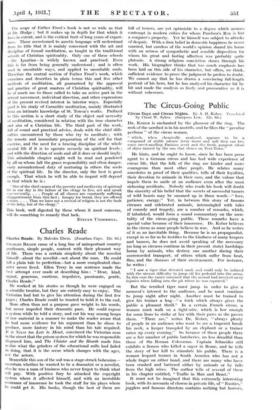Charles Reade
Charles Reade. By Malcolm Elwin. (Jonathan Cape. 12s. 6d.) CHARLES READE came of a long line of unimportant country gentlemen, simple people, content with their pleasant way of life. There was a certain simplicity about the novelist
himself—about the novelist—not about the man. He could tell a plain tale to perfection—but a more complicated char- acter never lived. Ellen Terry in one sentence made the Leit attempt ever made at describing him : " Dear, kind, unjust, generous, cautious, impulsive, passionate, gentle, Charles Reade."
He worked at his stories as though he were engaged on a scientific treatise, but they are entirely easy to enjoy. The Victorian had but to give his attention during the first few pages ; Charles Reade could be trusted to hold it to the end.
More often than not a purpose gave weight to his words, but never impeded their dramatic pace. He could expose a system while he told a story, and cut his way among heaps of raw material in a manner to make the reader aware that lie had more evidence for his argument than he chose to produce, more history in his mind than his tale required. It is Never too Late to Mend, convinced the Victorian man in the street that the prison system for 'which he was responsible disgraced him, and The Cloister and the Hearth made him realize what the grinders of the educational mills had failed in doing, that it is the scene which changes with the ages, not the actors.
Meanwhile this son of the soil was a stage-struck bohemian— uncertain whether he wanted to be a dramatist or a novelist, also he was a man of business who never forgot to think what will pay. With positive fury he attacked the copyright system where it affected himself, and with an incredible assurance of innocence he took the stuff for his plays where he could get it. His books, though the best of them are
full of terrors, are yet optimistic to a degree which arouses contempt in modern critics for whom Pandora's Box is but a conjurer's property. Yet he himself was subject to attacks of despair. With a firm belief in domestic happiness he never married, but careless of the world's opinion shared his home with an actress of sympathetic and sensible 'disposition for whom his great and lasting affection was probably quite platonic. A strong religious conviction shows through his work. His biographer thinks that too much emphasis has been laid on this side of his character, but offers, we think, sufficient evidence to prove the judgment he prefers to doubt. We cannot say that he has drawn a convincing full-length portrait of his hero, but he has analysed his character bit by bit and made the analysis as lively and provocative as it is without coherence.








































 Previous page
Previous page